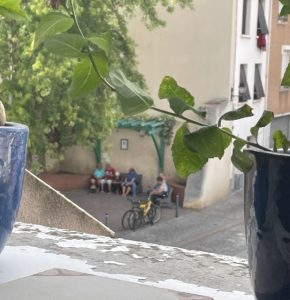Broken Planet
Dayle in Limoux – Day # 47
August 21, 2022The village people…nope, he ruined that phrase, too…the townspeople, when they meet in the in the little place [pronounced ‘ploss’], or square, down below without devices or agenda, are doing way more than nothing, they are doing everything. They c o m m u n i c a t e face-to-face with deep compassion and care for one another, and their tribe. They laugh, they dialogue…sometimes with incredible passion…sometimes silence. And it goes on for hours. They sit under the trees with their cool, cross natural ventilations and circulation, living with the heat not against.
🌱
And I thought of them when I read an email from one of my favorite beings on the planet right now, Baratunde Thurston, a writer and cultural critic. He contributes to PUCK. I learned of him watching Brian William’s ’11th Hour’ where he appeared a number of times with clarity and perspective, which, to me, was always right on. He wrote so beautifully from a place of anguish after witnessing the violent slap on the Oscar stage.
🌱
I was reminded of the French townspeople here in Limoux when he writes about his travels these summer months in Europe, particularly in Southern France/Spain when he refers to the blistering heat and the climate breakdown. I had some other things to share with you today, yet, I find his writing so profound and important, as well as in alignment with my own thoughts and feelings right now, I decided to share his email, as well as an event he has planned for NYC in September, free for those who join virtually. Sending him a virtual {hug} for that; thank you, Baratunde.
|
Buongiorno! I’m still on vacation, but I can confirm I will be returning, later than planned yet sooner than desired. After traveling for one month so far, it occurred to me this is the longest continuous amount of time I’ve spent outside the United States in my life. I’ve seen much of the world, but the vast majority of my time abroad has been for brief business and event purposes: a tech conference here, a television shoot there. Traveling for weeks with no real agenda, through countries where the primary language is not English, has been a refreshingly different experience. I won’t share exactly where I’ve been because there’s a non-zero chance that you are a real estate agent intent on buying and flipping these under-the-radar towns and villages. But I will share that my wife and I have been exploring Spain’s Costa Brava region, as well as Southern France, and that I’m drafting this letter from a centuries-old tower in the Puglia region of Italy. If you’re mildly resourceful, you can figure out the specifics—or just respond to this email and ask. I’m not the first traveler to observe this, but stepping outside of the familiar, daily stream of demands on your attention provides remarkable mental clarity. And what it’s allowed me to see are bustling markets, lively squares, and pristine beaches filled by people of all generations not consumed by their cell phones or by fear of mass shooters. I’ve driven hundreds of miles along the way, most of them in some stage of a roundabout: either entering, exiting, or preparing for the next one. I’ve happily adopted a rigid meal schedule—because everything here tastes so damn good because the food is actually food and not the latest iteration of a profit-maximizing science experiment. And I’ve received the highest honor a non-French person can receive, which is not a distinction by the Légion d’Honneur, but rather the simple compliment, by multiple residents of various French villages, that I speak their language perfectly. (Thanks to Blanca, my French instructor at Harvard in 1995 and 1996!) Throughout these various transnational experiences, one other thing has been an inescapable constant: the heat. It comes as no surprise. We broke the planet, and now we’re feeling heat records break, one after another. The latest report from The Intergovernmental Panel on Climate Change demonstrates what’s in store for us and how we got here to begin with. Simply put, it’s terrifying. (For a visual representation of the report, check out this infographic.) What’s more, there’s no guarantee that the incontrovertible fact of rising temperatures will be met by a single, unified response by the world. (If only!) Instead, how people respond will depend on their histories, their cultures, and their associated worldviews. What I’ve witnessed in Europe this past month has shown me how their response may differ from ours in the U.S.—and has given me some ideas about what more we can all do. |
|
A New Vision of Climate Action I’ve grown accustomed to air conditioning. If you have resources in the U.S., you crank up the A.C. and deny the reality of hot weather, whether you’re in your car, home, or place of business. But I’ve found that air conditioning is approached differently in Europe. They don’t recreate the conditions of a walk-in freezer inside their homes the way many of us do. Last night, in an effort to augment the weak air conditioning in our room, we asked the innkeeper for a fan. I don’t think anyone has ever done that here. When we plugged it in—I kid you not—we killed the power to the entire hotel. Thankfully, they simply reset a circuit in the morning, but it meant sleeping with no fan and no A.C. To my surprise, we slept fine. As a substitute for the reality-denying artifice of air conditioning, the people and places we’ve visited have tamed heat in other ways: by cleverly sealing every door and window in the afternoon; making brilliant use of cross breezes; walking on the shady side of the street; dipping in the sea; and by pausing all business, and indeed any form of kinetic activity, between 2 p.m. and 6 p.m. In other words, Europeans are responding to the collective challenge of climate change through conservation and sacrifice. Governments have mandated minimum cooling and maximum heat settings, prohibited illuminated outdoor advertising at night, and will fine companies for blasting the A.C. when their doors are open. Government buildings in Germany won’t even run hot water for half the year, and France has appointed a minister for ecological transition! I’ve shared reports of the climate-cooling centers in Barcelona, but what I saw on the ground in that city goes much further. Banners around the city pointed to this website inviting residents to participate in discussion and debate about how to build an economy that also makes the city more climate resilient. At a dinner party with expats, we learned about a local school that’s installing solar panels and planning to offer its excess energy to the surrounding neighborhood. Those same expats framed the political differences between Europe and the U.S. like this: in Europe, even the right-wing parties are interested in thinking about the temperature, and political debate is over what to set the thermometer to; in the U.S., the right wing resists the very idea of knowing the temperature. My extended break from the U.S. also got me thinking about the word “freedom”—a word that Americans have largely monopolized, but which means different things to different people around the world. There’s the freedom we associate with individual rights: my freedom to do what I want with my property, for example, or my freedom to bear arms. But there’s another variety of freedom, one that isn’t bound by human laws or edicts: the social freedom to coexist with others in peace; the economic freedom to spend time on activities other than work; the emotional freedom to gather in a square without worrying about an active shooter. Europe certainly isn’t heaven. There’s a long, violent history here of civil wars, colonization and racialized resource extraction. But one thing they seem to have figured out that we Americans could learn from is the balance between collective and individual self-interest. Here, things are weighted more towards the former, and, by and large, people seem to be happier because of it. Experiencing such a subtle but radical difference has been something to remember—and a reminder that these are choices all of us can make. |
And this is Baratunde’s information about his NYC event next month. And for those of us who can only attend virtually, there is no cost.
_________________
This September 21-24, I’ll be hosting Unfinished Live in NYC. This is an immersive live and digital event that, like me, exists at the intersection of technology, art, ideas, and impact. If you don’t think the future should be a foregone conclusion decided by a handful of tech companies hoarding all the things, consider joining.
See you soon!
I saw this synopsis from TMZ today posted after Bill Maher’s HBO show last night. I’ve been feeling this while in France. That is, no online shopping. Everything, every consumption, is purchased locally. And very little processed food. Haven’t seen one Amazon truck or van, even though I understand they do deliver to the area. The point is, the U.S. is catastrophic in its collective energy use, fossil fuel pollution, and junk food, especially in comparison to other countries.
[Bill Maher]
TMZ
“Bill Maher has a warning … online shopping is taking a not-so-hidden toll on America … and he makes a case that going OG shopping is better for your head and the planet.
The “Real Time” host went scorched earth on people who like to order 9 pairs of pants to find the one that fits just right … only to return the other 8. Those boxes go somewhere … yep, landfills, oceans … not good.
The visual tells the story … buy a small item, it comes in a big box. Buy 3 items … you get 3 big boxes. When you add it up, it’s kind of an environmental disaster.
And, then there’s the human toll … Americans don’t leave their homes like they used to because it’s easier to push a button than to start a car and drive to a mall. Thing is … Americans have become way more isolated, and it’s taking a mental toll, because we are social creatures who increasingly have stopped socializing.”
Food for thought.”
So much we can do in our micro and macro behaviors; to be cognizant of our choices, and how those choices have consequences for our planet, for Gaia.
Joe, we need an edict.
À bientôt
✌🏻



